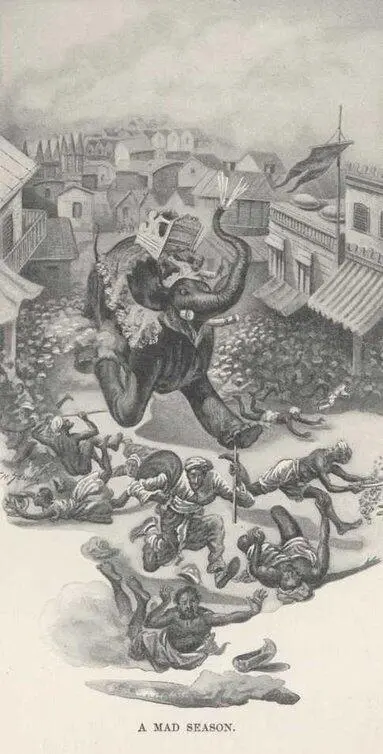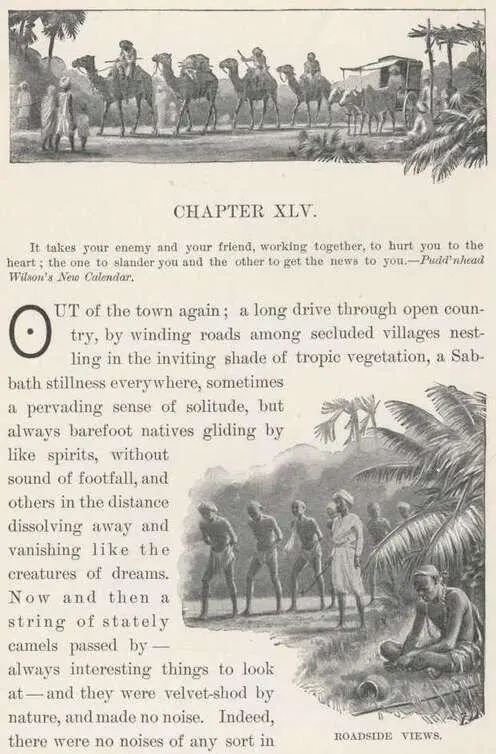Mark Twain - Following the Equator
Здесь есть возможность читать онлайн «Mark Twain - Following the Equator» весь текст электронной книги совершенно бесплатно (целиком полную версию без сокращений). В некоторых случаях можно слушать аудио, скачать через торрент в формате fb2 и присутствует краткое содержание. Год выпуска: 2004, Жанр: Классическая проза, Юмористическая проза, на английском языке. Описание произведения, (предисловие) а так же отзывы посетителей доступны на портале библиотеки ЛибКат.
- Название:Following the Equator
- Автор:
- Жанр:
- Год:2004
- ISBN:нет данных
- Рейтинг книги:3 / 5. Голосов: 1
-
Избранное:Добавить в избранное
- Отзывы:
-
Ваша оценка:
- 60
- 1
- 2
- 3
- 4
- 5
Following the Equator: краткое содержание, описание и аннотация
Предлагаем к чтению аннотацию, описание, краткое содержание или предисловие (зависит от того, что написал сам автор книги «Following the Equator»). Если вы не нашли необходимую информацию о книге — напишите в комментариях, мы постараемся отыскать её.
Following the Equator — читать онлайн бесплатно полную книгу (весь текст) целиком
Ниже представлен текст книги, разбитый по страницам. Система сохранения места последней прочитанной страницы, позволяет с удобством читать онлайн бесплатно книгу «Following the Equator», без необходимости каждый раз заново искать на чём Вы остановились. Поставьте закладку, и сможете в любой момент перейти на страницу, на которой закончили чтение.
Интервал:
Закладка:
At the foot of each sofa was a side-door, for entrance and exit. Along the whole length of the sofa on each side of the car ran a row of large single-plate windows, of a blue tint—blue to soften the bitter glare of the sun and protect one's eyes from torture. These could be let down out of the way when one wanted the breeze. In the roof were two oil lamps which gave a light strong enough to read by; each had a green-cloth attachment by which it could be covered when the light should be no longer needed.
While we talked outside with friends, Barney and Satan placed the hand-baggage, books, fruits, and soda-bottles in the racks, and the hold-alls and heavy baggage in the closet, hung the overcoats and sun-helmets and towels on the hooks, hoisted the two bed-shelves up out of the way, then shouldered their bedding and retired to the third class.
Now then, you see what a handsome, spacious, light, airy, homelike place it was, wherein to walk up and down, or sit and write, or stretch out and read and smoke. A central door in the forward end of the compartment opened into a similar compartment. It was occupied by my wife and daughter. About nine in the evening, while we halted a while at a station, Barney and Satan came and undid the clumsy big hold-alls, and spread the bedding on the sofas in both compartments—mattresses, sheets, gay coverlets, pillows, all complete; there are no chambermaids in India—apparently it was an office that was never heard of. Then they closed the communicating door, nimbly tidied up our place, put the night-clothing on the beds and the slippers under them, then returned to their own quarters.
January 31. It was novel and pleasant, and I stayed awake as long as I could, to enjoy it, and to read about those strange people the Thugs. In my sleep they remained with me, and tried to strangle me. The leader of the gang was that giant Hindoo who was such a picture in the strong light when we were leaving those Hindoo betrothal festivities at two o'clock in the morning—Rao Bahadur Baskirao Balinkanje Pitale, Vakeel to the Gaikwar of Baroda. It was he that brought me the invitation from his master to go to Baroda and lecture to that prince—and now he was misbehaving in my dreams. But all things can happen in dreams. It is indeed as the Sweet Singer of Michigan says—irrelevantly, of course, for the one and unfailing great quality which distinguishes her poetry from Shakespeare's and makes it precious to us is its stern and simple irrelevancy:
My heart was gay and happy,
This was ever in my mind,
There is better times a coming,
And I hope some day to find
Myself capable of composing,
It was my heart's delight
To compose on a sentimental subject
If it came in my mind just right.
—["The Sentimental Song Book," p. 49; theme, "The Author's Early Life," 19th stanza.]
Barroda. Arrived at 7 this morning. The dawn was just beginning to show. It was forlorn to have to turn out in a strange place at such a time, and the blinking lights in the station made it seem night still. But the gentlemen who had come to receive us were there with their servants, and they make quick work; there was no lost time. We were soon outside and moving swiftly through the soft gray light, and presently were comfortably housed—with more servants to help than we were used to, and with rather embarassingly important officials to direct them. But it was custom; they spoke Ballarat English, their bearing was charming and hospitable, and so all went well.
Breakfast was a satisfaction. Across the lawns was visible in the distance through the open window an Indian well, with two oxen tramping leisurely up and down long inclines, drawing water; and out of the stillness came the suffering screech of the machinery—not quite musical, and yet soothingly melancholy and dreamy and reposeful—a wail of lost spirits, one might imagine. And commemorative and reminiscent, perhaps; for of course the Thugs used to throw people down that well when they were done with them.
After breakfast the day began, a sufficiently busy one. We were driven by winding roads through a vast park, with noble forests of great trees, and with tangles and jungles of lovely growths of a humbler sort; and at one place three large gray apes came out and pranced across the road—a good deal of a surprise and an unpleasant one, for such creatures belong in the menagerie, and they look artificial and out of place in a wilderness.
We came to the city, by and by, and drove all through it. Intensely Indian, it was, and crumbly, and mouldering, and immemorially old, to all appearance. And the houses—oh, indescribably quaint and curious they were, with their fronts an elaborate lace-work of intricate and beautiful wood-carving, and now and then further adorned with rude pictures of elephants and princes and gods done in shouting colors; and all the ground floors along these cramped and narrow lanes occupied as shops—shops unbelievably small and impossibly packed with merchantable rubbish, and with nine-tenths-naked natives squatting at their work of hammering, pounding, brazing, soldering, sewing, designing, cooking, measuring out grain, grinding it, repairing idols—and then the swarm of ragged and noisy humanity under the horses' feet and everywhere, and the pervading reek and fume and smell! It was all wonderful and delightful.
Imagine a file of elephants marching through such a crevice of a street and scraping the paint off both sides of it with their hides. How big they must look, and how little they must make the houses look; and when the elephants are in their glittering court costume, what a contrast they must make with the humble and sordid surroundings. And when a mad elephant goes raging through, belting right and left with his trunk, how do these swarms of people get out of the way? I suppose it is a thing which happens now and then in the mad season (for elephants have a mad season).

I wonder how old the town is. There are patches of building—massive structures, monuments, apparently—that are so battered and worn, and seemingly so tired and so burdened with the weight of age, and so dulled and stupefied with trying to remember things they forgot before history began, that they give one the feeling that they must have been a part of original Creation. This is indeed one of the oldest of the princedoms of India, and has always been celebrated for its barbaric pomps and splendors, and for the wealth of its princes.
CHAPTER XLV.

It takes your enemy and your friend, working together, to hurt you to the heart; the one to slander you and the other to get the news to you.
—Pudd'nhead Wilson's New Calendar.
Elephant Riding—Howdahs—The New Palace—The Prince's Excursion—Gold and Silver Artillery—A Vice-royal Visit—Remarkable Dog—The Bench Show—Augustin Daly's Back Door—Fakeer
Out of the town again; a long drive through open country, by winding roads among secluded villages nestling in the inviting shade of tropic vegetation, a Sabbath stillness everywhere, sometimes a pervading sense of solitude, but always barefoot natives gliding by like spirits, without sound of footfall, and others in the distance dissolving away and vanishing like the creatures of dreams. Now and then a string of stately camels passed by—always interesting things to look at—and they were velvet-shod by nature, and made no noise. Indeed, there were no noises of any sort in this paradise. Yes, once there was one, for a moment: a file of native convicts passed along in charge of an officer, and we caught the soft clink of their chains. In a retired spot, resting himself under a tree, was a holy person—a naked black fakeer, thin and skinny, and whitey-gray all over with ashes.
Читать дальшеИнтервал:
Закладка:
Похожие книги на «Following the Equator»
Представляем Вашему вниманию похожие книги на «Following the Equator» списком для выбора. Мы отобрали схожую по названию и смыслу литературу в надежде предоставить читателям больше вариантов отыскать новые, интересные, ещё непрочитанные произведения.
Обсуждение, отзывы о книге «Following the Equator» и просто собственные мнения читателей. Оставьте ваши комментарии, напишите, что Вы думаете о произведении, его смысле или главных героях. Укажите что конкретно понравилось, а что нет, и почему Вы так считаете.











